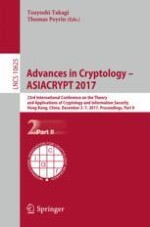2017 | OriginalPaper | Buchkapitel
Efficient Scalable Constant-Round MPC via Garbled Circuits
verfasst von : Aner Ben-Efraim, Yehuda Lindell, Eran Omri
Erschienen in: Advances in Cryptology – ASIACRYPT 2017
Aktivieren Sie unsere intelligente Suche, um passende Fachinhalte oder Patente zu finden.
Wählen Sie Textabschnitte aus um mit Künstlicher Intelligenz passenden Patente zu finden. powered by
Markieren Sie Textabschnitte, um KI-gestützt weitere passende Inhalte zu finden. powered by
